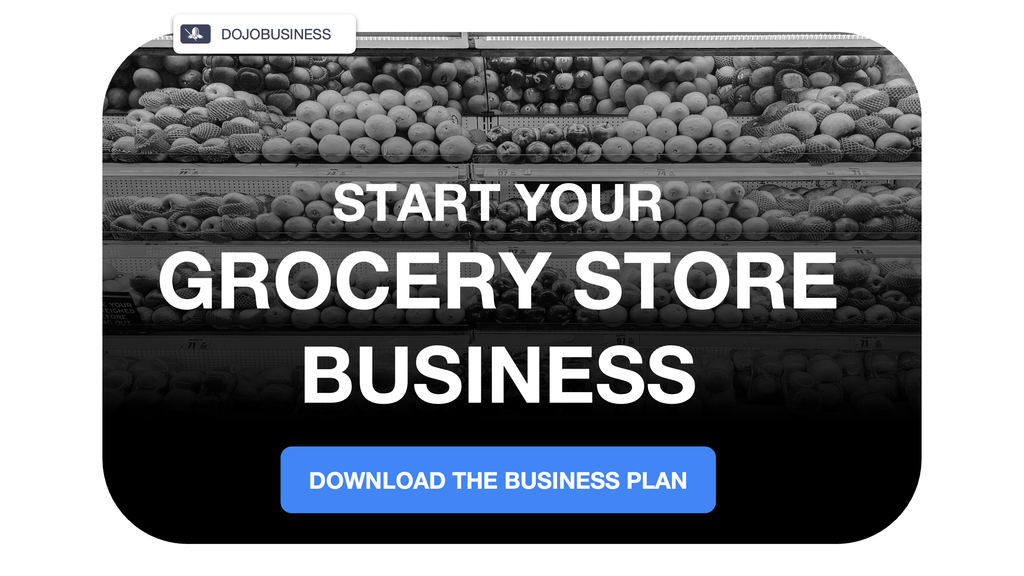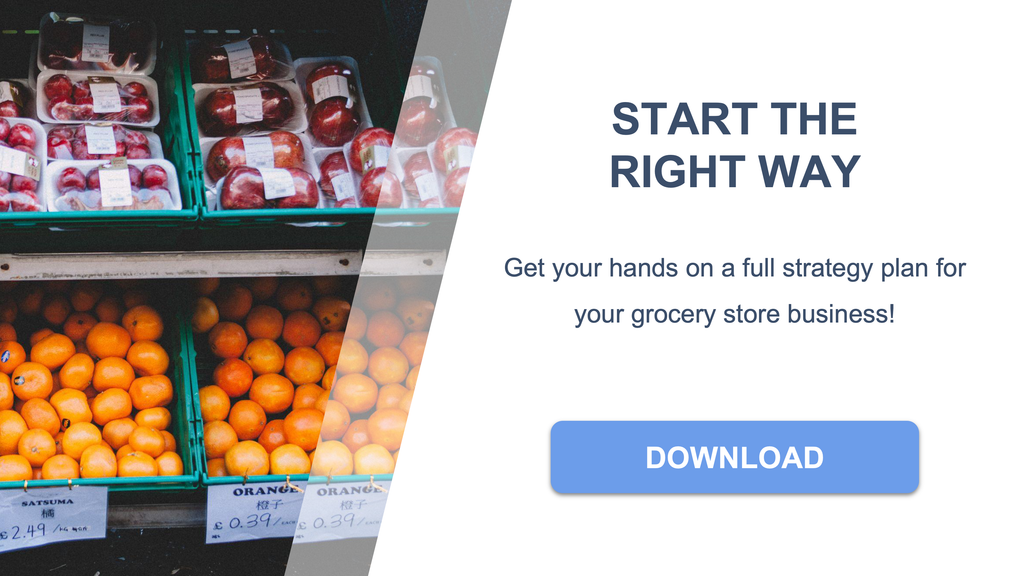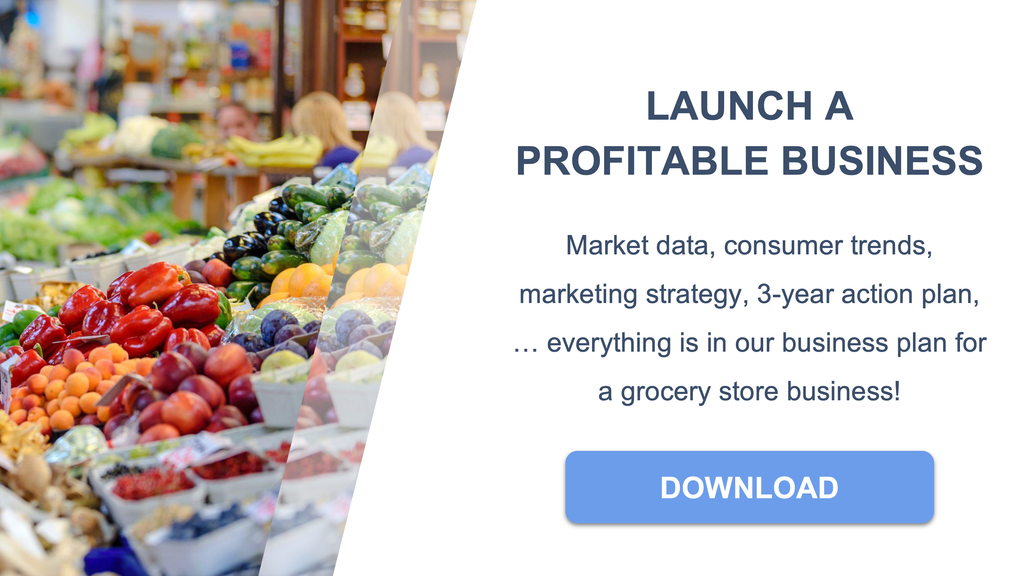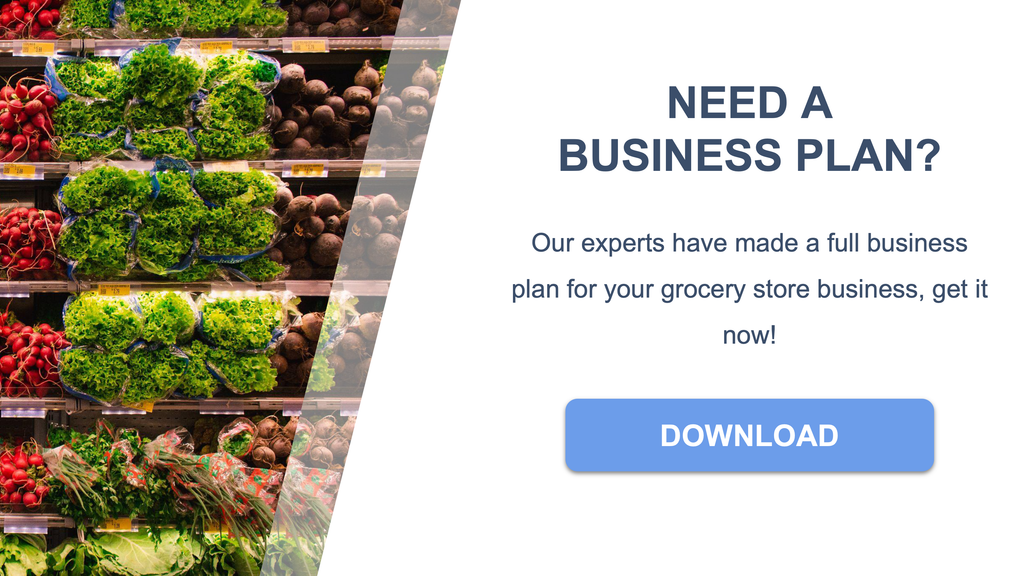
Have you been toying with the idea of opening your own grocery store but feel overwhelmed by the thought of where to start?
In the content that follows, we will present to you a comprehensive sample business plan tailored for a grocery store.
As an aspiring entrepreneur, you're likely aware that a robust business plan is crucial for achieving success. It serves as a roadmap, guiding you through setting your objectives, carving out your niche, and developing a coherent strategy for your venture.
To streamline the planning process and get a head start, you can utilize our grocery store business plan template. Additionally, our team is on standby to offer a complimentary review and refinement of your plan.

How to draft a great business plan for your grocery store?
A good business plan for a grocery store must cater to the unique aspects of retail food sales and distribution.
To start, it's important to provide a comprehensive overview of the grocery market. This should include current statistics and an examination of emerging trends in the industry, similar to what we've outlined in our grocery store business plan template.
Your business plan should articulate your vision clearly. Define your target market (such as families, health-conscious consumers, or budget shoppers) and your store's distinctive positioning (like focusing on organic products, local produce, ethnic foods, or discount pricing).
Market analysis is a critical component. You'll need to delve into the specifics of local competitors, market demands, and consumer buying habits.
For a grocery store, it's imperative to detail the range of products you'll carry. This includes perishables like produce and dairy, non-perishables, specialty items, and any additional services or departments (like a deli or bakery counter).
The operational plan should outline the location of your store, layout for efficient customer flow, inventory management, supplier relationships, and logistics for receiving and stocking products.
Quality control, inventory turnover, and compliance with health and safety regulations are particularly important for grocery stores.
Discuss your marketing and sales strategies. How will you draw in shoppers and encourage repeat business? Consider advertising tactics, loyalty programs, and potential ancillary services (such as home delivery or online shopping options).
Embracing digital strategies, including a robust website and active social media engagement, is crucial in the modern marketplace.
The financial section is vital. It should encompass your startup costs, projected revenue, operating expenses, and the point at which you expect to break even.
In a grocery store, with its thin margins and high competition, precise financial planning and a thorough understanding of your cash flow are essential. For assistance, refer to our financial forecast for a grocery store.
Compared to other business plans, a grocery store plan must pay closer attention to supply chain management, inventory turnover rates, and strategies for minimizing waste due to product spoilage.
A well-crafted business plan is a tool for the owner to crystallize their strategy and tactics, as well as to attract investors or secure loans.
Investors and lenders are looking for detailed market research, realistic financial projections, and a solid plan for the day-to-day operations of a grocery store.
By presenting a thorough and substantiated plan, you showcase your professionalism and dedication to the success of your grocery store.
To achieve these goals while saving time, you can fill out our grocery store business plan template.

A free example of business plan for a grocery store
Here, we will provide a concise and illustrative example of a business plan for a specific project.
This example aims to provide an overview of the essential components of a business plan. It is important to note that this version is only a summary. As it stands, this business plan is not sufficiently developed to support a profitability strategy or convince a bank to provide financing.
To be effective, the business plan should be significantly more detailed, including up-to-date market data, more persuasive arguments, a thorough market study, a three-year action plan, as well as detailed financial tables such as a projected income statement, projected balance sheet, cash flow budget, and break-even analysis.
All these elements have been thoroughly included by our experts in the business plan template they have designed for a grocery store.
Here, we will follow the same structure as in our business plan template.

Market Opportunity
Market Overview and Statistics
The grocery store industry is a fundamental and ever-present sector within the global economy.
As of recent estimates, the global grocery retail market value is projected to reach trillions of dollars, with a steady growth trajectory anticipated in the foreseeable future. This is driven by the increasing global population and the essential nature of grocery shopping.
In the United States alone, there are over 38,000 supermarkets, with a combined annual revenue of more than 600 billion dollars. This underscores the critical role grocery stores play in the daily lives of Americans and their substantial contribution to the economy.
These statistics highlight the grocery store industry's resilience and its importance as a staple of consumer spending.
Industry Trends
The grocery sector is witnessing several key trends that are shaping the future of food retail.
Organic and natural products are seeing a surge in demand as consumers become more health-conscious and concerned about the nutritional value of their food.
Eco-friendly practices and zero-waste initiatives are gaining traction, with shoppers showing a preference for stores that prioritize sustainability and reduce plastic usage.
Technology is revolutionizing the shopping experience, with the rise of online grocery shopping, delivery services, and in-store innovations like self-checkout systems and smart carts.
Local sourcing is becoming increasingly popular, as customers seek out products that support local farmers and producers, reducing the carbon footprint associated with transportation.
Transparency in food sourcing and ethical business practices are also becoming more important to consumers, who are willing to pay a premium for products that align with their values.
These trends are indicative of a consumer base that is more informed, engaged, and selective about where they purchase their groceries and what they contain.
Key Success Factors
Several factors contribute to the success of a grocery store in a competitive landscape.
Product variety and availability are crucial; a store that offers a wide range of products, including specialty and international items, can cater to diverse customer needs.
Competitive pricing and value for money are also important, as consumers are always looking for the best deals without compromising on quality.
A convenient and accessible location can significantly influence a store's foot traffic and sales volume.
Exceptional customer service is vital for ensuring a pleasant shopping experience and fostering customer loyalty.
Efficient inventory and supply chain management are key to keeping shelves stocked and reducing waste, thereby maximizing profitability.
Lastly, the ability to adapt to industry trends, such as offering online shopping options or expanding organic product lines, can position a grocery store as a forward-thinking leader in the market.

The Project
Project Presentation
Our grocery store project is designed to cater to the increasing consumer demand for healthy, organic, and specialty dietary products, including gluten-free, vegan, and non-GMO options. Strategically located in a community with health-conscious residents, our store will offer a diverse selection of fresh produce, organic foods, and specialty items that are often hard to find in conventional supermarkets.
We will prioritize sourcing from local farmers and producers to ensure the highest quality and freshness. Our store will not only be a place to shop but also a hub for the community to learn about and engage with healthy eating habits.
With a commitment to sustainability and wellness, our grocery store aims to be a leader in the local food movement, providing a one-stop-shop for nutritious and environmentally friendly food choices.
Value Proposition
The value proposition of our grocery store is centered around offering a curated selection of healthy, organic, and specialty food products that cater to various dietary needs and preferences. We understand the importance of having access to food that supports well-being and aligns with personal values.
Our commitment to quality, sustainability, and community engagement offers a unique shopping experience that goes beyond the transactional nature of typical grocery shopping. We aim to foster a sense of community and provide educational opportunities about the benefits of healthy eating and sustainable living.
By focusing on the needs of health-conscious consumers and those with specific dietary restrictions, our grocery store will become a trusted source for wholesome food and a beacon for a healthier lifestyle within the community.
Project Owner
The project owner is an entrepreneur with a passion for health, nutrition, and community well-being. With a background in the food and retail industry, they bring a wealth of knowledge and experience to the table.
They have a strong commitment to environmental sustainability and have been actively involved in local food initiatives. Their dedication to providing access to high-quality, nutritious food is the cornerstone of this grocery store project.
With a vision to create a space where the community can come together to support local producers and learn about the benefits of a healthy diet, the project owner is the driving force behind this initiative, aiming to make a positive impact on the health and sustainability of the local area.

The Market Study
Market Segments
The market segments for this specialized gluten-free grocery store are diverse and multifaceted.
Primary customers include individuals with gluten intolerance or celiac disease who require gluten-free products for their daily nutrition.
Additionally, there is a growing segment of health-conscious consumers who opt for gluten-free items as part of a lifestyle choice or dietary preference.
Parents seeking healthier food options for their families, particularly those with children who have gluten sensitivities, also represent a significant market segment.
Healthcare professionals, such as dietitians and gastroenterologists, may recommend our store to patients needing gluten-free diets, thus becoming indirect promoters of our business.
SWOT Analysis
Conducting a SWOT analysis for the gluten-free grocery store highlights several key factors.
Strengths include a wide selection of gluten-free products, knowledgeable staff, and a strong focus on customer health and satisfaction.
Weaknesses might encompass the premium pricing of gluten-free products and the challenge of maintaining a fully gluten-free inventory.
Opportunities can be found in the increasing public interest in gluten-free diets and the potential to partner with local gluten-free producers.
Threats include the entry of larger supermarkets into the gluten-free niche and price competition from online retailers.
Competitor Analysis
Competitor analysis for the gluten-free grocery sector indicates a competitive landscape.
Direct competitors include other specialty health food stores, organic markets, and larger grocery chains with dedicated gluten-free sections.
These competitors vie for the attention of a discerning customer base that values product variety and quality.
Competitive advantages may be gained through superior product selection, exceptional customer service, community engagement, and loyalty programs.
Understanding the competitive landscape is crucial for carving out a unique market position and fostering customer loyalty.
Competitive Advantages
Our gluten-free grocery store's competitive edge lies in our unwavering dedication to product quality and customer health.
We offer an extensive array of gluten-free groceries, from staples like bread and pasta to specialty items, all sourced from trusted manufacturers and local suppliers.
Our knowledgeable staff is trained to provide personalized shopping assistance, helping customers make informed choices about their dietary needs.
We are committed to transparency, providing clear labeling and information about the gluten-free status and nutritional content of our products, thereby building trust and loyalty among our health-conscious clientele.
You can also read our articles about:
- how to open a grocery store: a complete guide
- the customer segments of a grocery store
- the competition study for a grocery store

The Strategy
Development Plan
Our three-year development plan for the specialized gluten-free grocery store is designed to meet the increasing demand for gluten-free products.
In the first year, we aim to establish a strong foothold in the local market by offering a wide range of gluten-free groceries and emphasizing customer service excellence.
The second year will focus on expanding our product offerings to include organic and locally-sourced gluten-free items, as well as implementing a loyalty program to retain customers.
In the third year, we plan to explore opportunities for online sales and home delivery services to increase convenience for our customers and extend our market reach.
Throughout this period, we will prioritize sustainability, community engagement, and continuous improvement to ensure we meet and exceed customer expectations while growing our market share.
Business Model Canvas
The Business Model Canvas for our gluten-free grocery store targets individuals with celiac disease, gluten intolerance, and those who prefer gluten-free products for lifestyle reasons.
Our value proposition is centered on providing a diverse and high-quality selection of gluten-free groceries, exceptional customer service, and a knowledgeable staff to assist with dietary needs.
We will operate through a physical storefront complemented by an online platform, utilizing key resources such as our supply chain relationships and our expertise in gluten-free products.
Key activities include inventory management, customer education, and community engagement.
Our revenue streams will be generated from the sales of gluten-free groceries, while our costs will be associated with inventory procurement, staffing, and operational expenses.
Access a detailed and customizable Business Model Canvas in our business plan template.
Marketing Strategy
Our marketing strategy is centered on community engagement and education.
We plan to connect with our target audience by hosting gluten-free cooking classes, nutritional seminars, and partnering with local health experts.
We will also leverage social media platforms to share gluten-free recipes, health tips, and new product arrivals to build a strong online community.
Additionally, we will collaborate with local fitness centers and wellness clinics to cross-promote our offerings and gain referrals.
Our commitment to providing a wide range of gluten-free products and fostering a supportive community will be at the forefront of our marketing efforts.
Risk Policy
Our risk policy for the gluten-free grocery store focuses on mitigating risks associated with product sourcing, inventory management, and customer satisfaction.
We will ensure strict compliance with gluten-free certification standards and conduct thorough vetting of suppliers to guarantee product integrity.
Inventory levels will be closely monitored to prevent overstocking and ensure product freshness. We will also implement a responsive customer feedback system to address any concerns promptly.
To safeguard against financial uncertainties, we will maintain a conservative financial approach and secure comprehensive insurance coverage.
Our priority is to provide safe, high-quality gluten-free groceries while maintaining the trust and loyalty of our customers.
Why Our Project is Viable
We are committed to establishing a gluten-free grocery store that serves the needs of a growing segment of health-conscious consumers.
With our focus on quality, customer education, and community involvement, we believe we can carve out a significant niche in the grocery market.
We are excited about the opportunity to enhance the shopping experience for those seeking gluten-free options and are confident in the viability of our business concept.
We remain adaptable to market trends and customer feedback, ensuring that our store remains a preferred destination for gluten-free shopping.
You can also read our articles about:
- the Business Model Canvas of a grocery store
- the marketing strategy for a grocery store

The Financial Plan
Of course, the text presented below is far from sufficient to serve as a solid and credible financial analysis for a bank or potential investor. They expect specific numbers, financial statements, and charts demonstrating the profitability of your project.
All these elements are available in our business plan template for a grocery store and our financial plan for a grocery store.
Initial expenses for our specialty grocery store include leasing a retail space in a strategic location, outfitting the store with shelving and refrigeration units suitable for a diverse range of products, purchasing initial inventory with a focus on gluten-free and organic items, obtaining necessary licenses and permits, investing in a point-of-sale system, and costs related to brand creation and launching targeted marketing campaigns to reach health-conscious consumers.
Our revenue assumptions are based on a comprehensive analysis of local demand for specialty grocery items, taking into account the increasing trend towards healthy eating and the need for dietary-specific products.
We anticipate a steady growth in sales, starting with a strong opening and expanding as the reputation of our specialty grocery store grows within the community.
The projected income statement outlines expected revenues from our product sales, cost of goods sold (inventory procurement, vendor payments, etc.), and operating expenses (rent, marketing, salaries, utilities, etc.).
This results in a forecasted net profit that is essential for assessing the long-term viability of our grocery store.
The projected balance sheet reflects assets such as inventory, store fixtures, and equipment, and liabilities including loans and accounts payable.
It provides a snapshot of the financial standing of our grocery store at the end of each fiscal period.
Our projected cash flow statement details the inflows and outflows of cash, enabling us to plan for cash requirements throughout the year. This is crucial for maintaining smooth operations and handling supplier payments and other financial commitments.
The projected financing plan identifies the mix of equity and debt financing we intend to use to fund our initial setup and operational costs.
The working capital requirement for our grocery store will be diligently managed to ensure we have sufficient funds to support day-to-day activities, such as restocking inventory, managing payroll, and other short-term expenses.
The break-even analysis will determine the sales volume we need to achieve to cover all our costs and begin generating a profit.
It will serve as a critical benchmark for the financial success of our store.
Key performance indicators we will monitor include the inventory turnover rate to measure the efficiency of our stock management, the gross margin to evaluate the profitability of our product lines, and the current ratio to assess our ability to meet short-term liabilities with current assets.
These metrics will be instrumental in gauging the financial health and operational success of our specialty grocery store.
If you want to know more about the financial analysis of this type of activity, please read our article about the financial plan for a grocery store.

